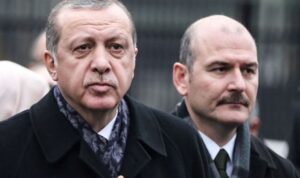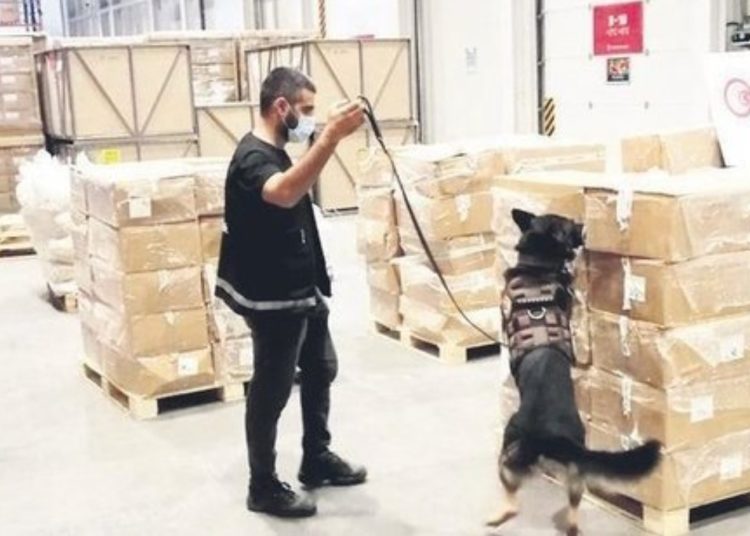Abdullah Bozkurt/Stockholm
A whistleblower who had long overseen an organized crime syndicate in Turkey’s capital city of Ankara has revealed how police officers from the narcotics and organized crime units were engaged in the sale and distribution of cocaine, with the full awareness of the government.
Erhan Gündüz, a 38-year-old convicted felon who had led an organized crime syndicate before being imprisoned on extortion charges, made the decision to divulge everything he knew about drug and arms trafficking and to identify his former partners.
In a confidential statement provided to the police at a prison in Karabük on November 1, 2023, Gündüz revealed how a cocaine distribution center had operated right under the nose of the special police unit tasked with combating narcotics crimes. He disclosed the identities of individuals in the police force who had aided in facilitating the drug trafficking network. In exchange for this information, he requested protection and transfer to a secure prison, citing threats from his former associates.
According to whistleblower Gündüz, Bora Kaplan (also known as Ayhan with his assumed name), a detained drug trafficker who owns multiple entertainment venues in Ankara, operated with impunity for years with protection provided by then-interior minister Süleyman Soylu. He had multiple police officers on his payroll, with the key figure being then-police chief Necati Çevik, who served as head of the organized crime unit in the Ankara Police Department in 2016 and facilitated Kaplan’s contacts with the police.
The police chief and drug trafficker Kaplan frequently made trips to Istanbul to transport cocaine to Ankara. The whistleblower, who had known Kaplan since childhood and had worked with him, stated that he personally accompanied the two on three such trips, each involving the transport of 10 kilos of cocaine. During one of these trips, the car loaded with cocaine was stopped at a police checkpoint on the way out of Istanbul. However, they were allowed to proceed after police chief Çevik identified himself to the officers who had stopped the car.
The whistleblower said he had videotaped Kaplan and the police chief exchanging a yellow envelope that contained cash during a lunch meeting. He handed the photos and videos he had recorded on his iPhone over to the police through his lawyer as evidence to support his allegations. However, no criminal investigation has been initiated against police chief Çevik regarding these claims, implying that he may have had the protection of members of senior leadership who were aware of his actions. Çevik was later reassigned to another post but remained in the police force.
Gündüz revealed the existence of a secret cocaine hub situated in the heart of the Turkish capital, where drug traffickers processed cocaine for distribution to clients. This venue is located on Konak Street in Ankara’s Kızılay neighborhood, just a few buildings down from the police station housing the narcotic unit’s intelligence and surveillance section.
Full text of the statement by whistleblower Erhan Gündüz:
He said a police officer named Mesut Onur, who worked in the narcotics unit and was responsible for the wiretapping section, had long been on the payroll of the drug syndicate operated by Kaplan and his associate Kadir İnan, another influential figure involved in drug and arms trafficking.
The officer was receiving a monthly payment of 40,000 Turkish lira (equivalent to approximately $14,000 at the exchange rate in effect at the time) in 2016, which was nearly 12 times his official government salary. Moreover, he received cars and homes as gifts for the work he did for the syndicate. Several other police officers from the same narcotics unit were also receiving bribes from the syndicate.
Onur also sold some of the drugs that he and other corrupt police officers managed to stash from police drug busts back to drug dealers in exchange for cash and other perks. The whistleblower claimed that in 2016 the police officer handed over 1,130 kilograms of heroin to a drug dealer named Serdar Dinc and received payment in cash, cars and the transfer of a deed for a new house as compensation.
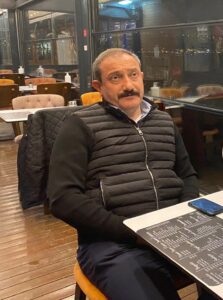
The government was fully aware of these activities but took no action. In fact, Onur’s activities came to light in 2017 when a drug courier working for drug lord İnan was apprehended during a routine traffic checkpoint. The police found incriminating messages exchanged between the courier and Onur, leading to an investigation into the corrupt police officer. Onur was arrested and spent 45 days in jail, but he was subsequently released after Kaplan intervened by leveraging favors with prosecutors and judges who were receiving bribes from the drug syndicate. Following his release, Onur returned to the police force but was reassigned to a different unit.
Kaplan later split from İnan to establish his own independent network and rapidly expanded his empire in the Turkish capital. He received assistance from then-interior minister Soylu, who directed the police to eliminate his rivals and shielded him from police crackdowns. Individuals who had been victimized by Kaplan and had filed numerous criminal complaints against him were also silenced. They were coerced into withdrawing their complaints after Soylu and former Ankara police chief Servet Yılmaz, the minister’s hand-picked man, intervened on behalf of the drug syndicate.
Kaplan’s fortunes took a turn when President Recep Tayyip Erdogan chose to remove Soylu from the cabinet following the 2023 general election. This decision was aimed at undermining Soylu’s political aspirations to succeed him. Soylu was perceived as a threat to the political dynasty of Erdogan, who had been considering a family member to inherit his political legacy rather than Soylu or any other outsider.
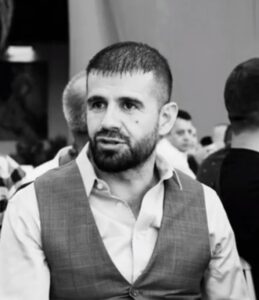
Consequently, Kaplan was apprehended on September 7, 2023, while attempting to flee the country after Soylu lost his position in the cabinet. In an effort to undermine Soylu’s financial resources, which could potentially be utilized to mount a political challenge to Erdogan, Kaplan and others who had collaborated closely with the minister and funneled cash to his political machine became targets.
According to allegations outlined in the investigation case file against the drug syndicate, it is claimed that not only minister Soylu but also former Ankara police chief Yılmaz and former Ankara chief public prosecutor Yüksel Kocaman collaborated to shield Kaplan from law enforcement agencies and obstruct criminal investigations into him. As a result Kaplan had been able to operate freely despite having outstanding arrest warrants and pending criminal complaints against him.
Allegations suggesting that Kocaman received a luxury villa and an expensive car as gifts from Kaplan in exchange for dismissing criminal complaints exposed the widespread corruption within the judiciary in the country. Although Kocaman denied the allegations of receiving gifts, he did admit to meeting the mobster in person during a dinner and terminating the probes against him. Furthermore, his opulent and extravagant lifestyle was incongruent with the salary he received from the government.
According to Gündüz, Kaplan was also collaborating with Vedat Ali Özışık, the former chairman of Kayseri Şeker Fabrikası (Kayseri Sugar Refinery), for the sale and distribution of drugs. Özışık was indicted in 2010 on charges of leading a criminal organization that involved former Kayseri police chief Orhan Özdemir and former Kayseri deputy governor Ali Yener Erçin. However, all suspects in the case were subsequently released by the Erdogan government following blatant interference in the judicial process.
The whistleblower further detailed how he resolved the outstanding arrest warrant for him while he was a fugitive. With the assistance of a police officer identified only by the first name of Tahsin, who was a member of the organized crime unit and on Kaplan’s payroll, Gündüz claimed to have arranged a meeting with police chief Zafer Kunduz. At the time, Kunduz was heading the unit combating extortion, the very crime the whistleblower was charged with. During the meeting, the police chief spoke with the public prosecutor handling the case and swiftly secured Gündüz’s release at his arraignment.
For his release, Gündüz paid a police commissioner named Hasan from the extortion unit half a million Turkish lira, a sum that would likely be shared with his superiors in the unit.
The whistleblower also identified two key individuals involved in laundering money from the proceeds of illegal drug and arms sales: Kaplan’s lawyers, Cengiz Haliç and Tarık Teoman. They operated a number of shell companies to launder the money. After being tipped off about an impending police operation against him, Haliç fled the country and reportedly is living as a fugitive in Dubai.
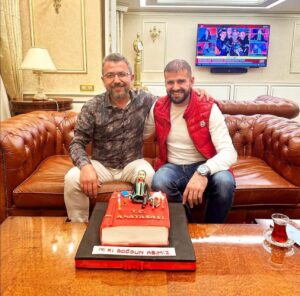
Haliç also served as an intermediary to obtain political protection for the drug syndicate by coordinating with Sadık Soylu, a government employee and the cousin of former interior minister Soylu. The lawyer provided cash to the minister through Soylu’s cousin in exchange for protection from any crackdown. Additionally, it was Haliç who managed the syndicate’s connections to former chief prosecutor Kocaman.
The whistleblower’s allegations were further supported by the testimony of a secret witness, identified only as a former member of the drug syndicate who had worked for Kaplan for many years. According to the witness’s testimony, provided on October 9, 2023 and incorporated into the investigation file, Kaplan was detained in 2018 on charges related to the possession of illegal firearms. However, he was quickly released after his lawyer, Haliç, met with the interior minister’s cousin and Barış Kurt, the former head of the ruling Justice and Development Party’s (AKP) Ankara provincial branch. Soylu and Kurt had a meeting with the judge overseeing Kaplan’s arrest case and secured his speedy release.
The secret witness also revealed how the drug syndicate gifted former chief prosecutor Kocaman with a luxury BMW, renovated his apartment free of charge and assisted Kocaman’s transportation company, Kocaman Nakliyat, with new, no-bid contracts. Kocaman, who had facilitated crackdowns on Erdogan’s opponents through blatant abuse of the judicial system, is currently serving as a member of the Supreme Court of Appeals.
During his tenure as the chief prosecutor in Ankara between 2017 and 2020, Kocaman played a key role in dropping criminal investigations initiated against Kaplan. In 2017 a criminal investigation on drug trafficking charges into Kaplan was dropped. A year later, another investigation involving crimes such as forming a criminal organization, forgery of official documents, purchase of stolen goods and counterfeiting money was also dropped by the prosecutor’s office. Furthermore, in 2019, a decision of non-prosecution was made for the allegations of Kaplan forming a criminal organization and trafficking narcotics.
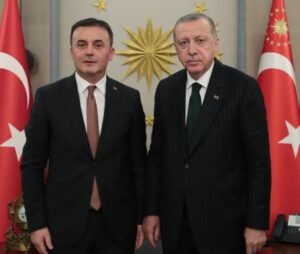
The witness identified the İrem Kuyumculuk jewelry store, owned by Kürşat Tan Hakbilir, as another venue used to launder the drug syndicate’s money. Moreover, an iron and steel trading firm called Avrasya Ankara Sac Profil Demir Çelik Ltd. Şti., owned by Mehmet Akif Çetin, was also implicated in the money laundering scheme.
After the falling out between Erdogan and Soylu, the office of the chief public prosecutor in Ankara filed an indictment against Kaplan and his close associates Fethi Koyuncu, Mutlu Ayaş, Yusuf İzzet Savaş, Kanber Keskin and Serdar Sertçelik, along with 55 other suspects, on January 5, 2024. The trial is scheduled to begin on April 15 at the Ankara 32nd High Criminal Court.
Kaplan and his five associates in leadership were accused of establishing and leading an armed organization with the intent to commit various crimes including murder, robbery, kidnapping, torture, evidence tampering and aiding and abetting criminals. If convicted, they face aggravated life sentences.
In the meantime, the corrupt public employees such as police, prosecutors and judges who aided and abetted the drug syndicate have not yet faced charges for their involvement. It remains to be seen how far Erdogan is willing to pursue the case and whether he intends to minimize the damage to his government resulting from the exposure of these dirty secrets.
The Kaplan case is just the tip of the iceberg, revealing a deeply entrenched network of corruption within the Turkish judiciary and law enforcement agencies. This network has frequently been facilitated and protected by politicians wielding significant influence within the Erdogan government.
